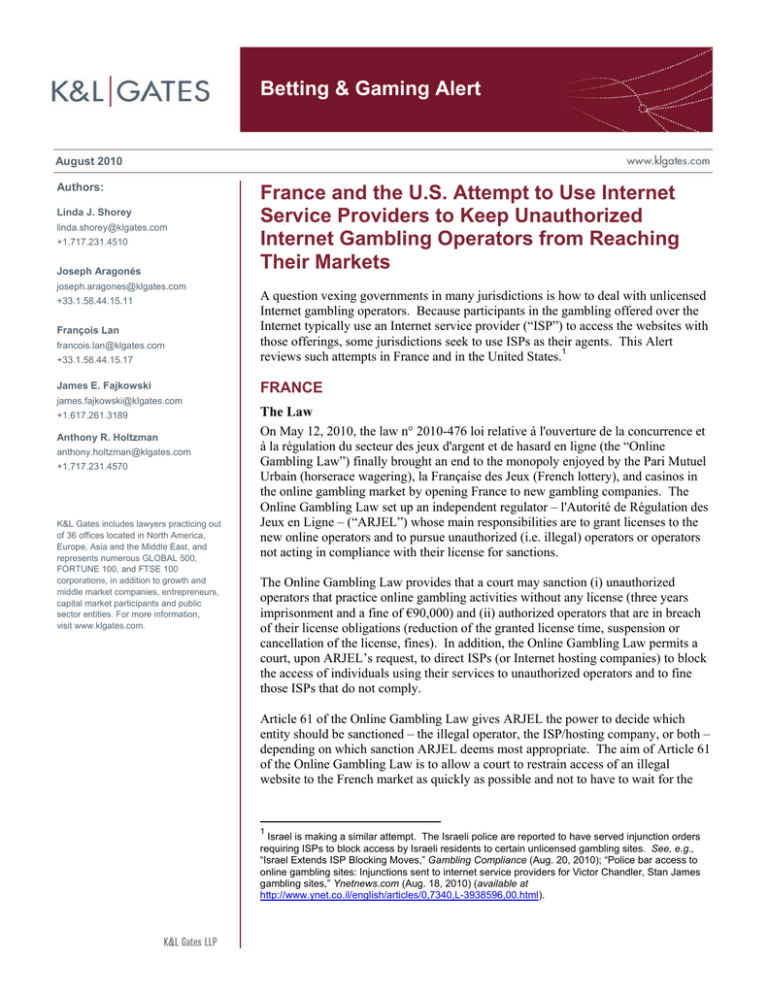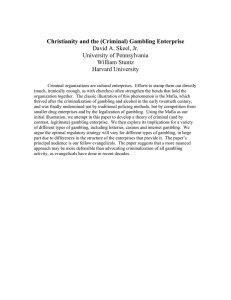
Betting & Gaming Alert
August 2010
Authors:
Linda J. Shorey
linda.shorey@klgates.com
+1.717.231.4510
Joseph Aragonés
joseph.aragones@klgates.com
France and the U.S. Attempt to Use Internet
Service Providers to Keep Unauthorized
Internet Gambling Operators from Reaching
Their Markets
+33.1.58.44.15.17
A question vexing governments in many jurisdictions is how to deal with unlicensed
Internet gambling operators. Because participants in the gambling offered over the
Internet typically use an Internet service provider (“ISP”) to access the websites with
those offerings, some jurisdictions seek to use ISPs as their agents. This Alert
reviews such attempts in France and in the United States.1
James E. Fajkowski
FRANCE
+33.1.58.44.15.11
François Lan
francois.lan@klgates.com
james.fajkowski@klgates.com
+1.617.261.3189
Anthony R. Holtzman
anthony.holtzman@klgates.com
+1.717.231.4570
K&L Gates includes lawyers practicing out
of 36 offices located in North America,
Europe, Asia and the Middle East, and
represents numerous GLOBAL 500,
FORTUNE 100, and FTSE 100
corporations, in addition to growth and
middle market companies, entrepreneurs,
capital market participants and public
sector entities. For more information,
visit www.klgates.com.
The Law
On May 12, 2010, the law n° 2010-476 loi relative à l'ouverture de la concurrence et
à la régulation du secteur des jeux d'argent et de hasard en ligne (the “Online
Gambling Law”) finally brought an end to the monopoly enjoyed by the Pari Mutuel
Urbain (horserace wagering), la Française des Jeux (French lottery), and casinos in
the online gambling market by opening France to new gambling companies. The
Online Gambling Law set up an independent regulator – l'Autorité de Régulation des
Jeux en Ligne – (“ARJEL”) whose main responsibilities are to grant licenses to the
new online operators and to pursue unauthorized (i.e. illegal) operators or operators
not acting in compliance with their license for sanctions.
The Online Gambling Law provides that a court may sanction (i) unauthorized
operators that practice online gambling activities without any license (three years
imprisonment and a fine of €90,000) and (ii) authorized operators that are in breach
of their license obligations (reduction of the granted license time, suspension or
cancellation of the license, fines). In addition, the Online Gambling Law permits a
court, upon ARJEL’s request, to direct ISPs (or Internet hosting companies) to block
the access of individuals using their services to unauthorized operators and to fine
those ISPs that do not comply.
Article 61 of the Online Gambling Law gives ARJEL the power to decide which
entity should be sanctioned – the illegal operator, the ISP/hosting company, or both –
depending on which sanction ARJEL deems most appropriate. The aim of Article 61
of the Online Gambling Law is to allow a court to restrain access of an illegal
website to the French market as quickly as possible and not to have to wait for the
1
Israel is making a similar attempt. The Israeli police are reported to have served injunction orders
requiring ISPs to block access by Israeli residents to certain unlicensed gambling sites. See, e.g.,
“Israel Extends ISP Blocking Moves,” Gambling Compliance (Aug. 20, 2010); “Police bar access to
online gambling sites: Injunctions sent to internet service providers for Victor Chandler, Stan James
gambling sites,” Ynetnews.com (Aug. 18, 2010) (available at
http://www.ynet.co.il/english/articles/0,7340,L-3938596,00.html).
Betting & Gaming Alert
enforcement of a French decision against a foreign
company, which, depending on the country, could be
uncertain and take time.
Using the Law
In June 2010, ARJEL identified several online
gambling operators that were marketing to French
customers without a license, including the Gibraltarbased operator Stan James. ARJEL notified and
requested Stan James to stop marketing to French
customers. On July 7, 2010, in the absence of a
response by Stan James, ARJEL brought an action
before the Civil Court of Paris (Tribunal de Grande
Instance de Paris) against seven major French ISPs
and one UK hosting company. This is the first
major action ARJEL has taken against ISPs and
hosting companies rather than the illegal operator.
On August 6, 2010, the Tribunal de Grande Instance
de Paris directed the French ISPs to take all
necessary measures to stop their French customers
from accessing the illegal website operated by Stan
James. The Court imposed a fine of €10,000 per
day, if such measures were not implemented two
months after the date of judgment and ordered the
ISPs to liaise with ARJEL, in order that ARJEL
could verify that the measures directed by the Court
had been applied. The Court did not require the
ISPs to use any specific method to block access to
the illegal operator but gave each ISP the
responsibility to determine appropriate measures to
prevent access by the illegal operator to the French
market. With respect to the UK hosting company,
the Court postponed its decision due to a procedural
error.
During the trial, all the ISPs challenged the option
chosen by ARJEL and the fact that despite being the
main actor, the illegal website was not directly
included in the lawsuit. ARJEL and the court
rejected those claims based on Article 61 of the
Online Gambling Law. Some of the ISPs also
argued that Article 61 violates the European Human
Right law. They also argued that the sanction
imposed on them was pointless, given that the illegal
operator can circumnavigate any measures that
might be applied by the ISP by doing such things as
setting up alternative domain names and URLs.
This judgment is not necessarily the end of the case,
since it was rendered by a court of first instance
jurisdiction and is still subject to appeal. According
to commentators, a court of appeal may take into
consideration certain of the ISP’s claims and
overrule the decision.
UNITED STATES
The Law
Subsection (a) of the federal Wire Act provides that
“[w]hoever being engaged in the business of betting
or wagering knowingly uses a wire communication
facility for the transmission in interstate or foreign
commerce of bets or wagers or information assisting
in the placing of bets or wagers on any sporting
event or contest…shall be fined under this title or
imprisoned not more than two years, or both.” 18
U.S.C. §1084(a). Subsection (d) of the Wire Act
permits federal, state or local law enforcement
agencies to direct, in writing, any common carrier
under the jurisdiction of the Federal
Communications Commission (“FCC”), if its
facilities are “being used for the purpose of
transmitting or receiving gambling information in
interstate or foreign commerce in violation of
Federal, State or local law,” to “discontinue or
refuse” to provide those facilities. 18 U.S.C.
§1084(d).
Minnesota’s Attempted Use of the Law
On April 24, 2009, the Alcohol and Gambling
Enforcement Division of the Minnesota Department
of Public Safety (“Division”) notified eleven major
ISP and telephone carriers that their telephone or
Internet facilities, or both, were being used by
operators of alleged Internet gambling websites to
transmit gambling information in violation of
Minnesota law. The Division instructed the carriers
to “block access to these sites by customers located
within Minnesota” and provided them with a list of
the sites, which contained approximately 200
entries. It also informed the FCC of its actions,
noting that “[o]nline gambling is illegal in our
jurisdiction” and “[i]f this process proves
successful[,] we will continue with more sites and
more providers.”
In response, on May 6, 2009, the Interactive Media
Entertainment & Gaming Association (“iMEGA”),
on behalf of its members (including some of the
operators of the listed gambling websites), filed a
complaint in the federal district court for the District
August 2010
2
Betting & Gaming Alert
of Minnesota. The complaint challenged the
Division’s direction to the ISPs to block Minnesotabased persons from accessing the gambling
websites. See Civil No. 0:09-cv-01065-JNE-JJG (D.
Minn.) (Complaint filed May 6, 2009). The lawsuit
was based, in part, on language in subsection (d) of
the Wire Act providing that “[n]othing in this
section shall be deemed to prejudice the right of any
person affected thereby to secure an appropriate
determination, as otherwise provided by law, in a
Federal court or in a State or local tribunal or
agency, that such facilit[ies] should not be
discontinued or removed, or should be restored.” 18
U.S.C. §1084(d).
The complaint alleged, among other things, that the
Division’s actions did not comport with subsection
(d) and infringed upon the rights of iMEGA’s
members under the First Amendment and under the
dormant Commerce Clause of the U.S. Constitution.
The court, however, never had the chance to rule on
these issues. Instead, the parties reached an
amicable resolution of the case, pursuant to which
the Division withdrew the notices directing the ISPs
to block the alleged gambling websites and iMEGA
filed a notice of dismissal of the case.
CONCLUSION
It is difficult for governments to shut down
gambling websites believed to be illegally providing
gambling services to its residents because most of
the operators of the sites are located outside the
governments’ jurisdictional reach. As a result,
governments look for other ways to stop the
activity. Using ISPs as tools, by directing them to
block gambling websites, is an attractive option. It
is likely that other jurisdictions will attempt it,
either by enacting new legislation or adapting
legislation already in place.
Anchorage Austin Beijing Berlin Boston Charlotte Chicago Dallas Dubai Fort Worth Frankfurt Harrisburg Hong Kong London
Los Angeles Miami Moscow Newark New York Orange County Palo Alto Paris Pittsburgh Portland Raleigh Research Triangle Park
San Diego San Francisco Seattle Shanghai Singapore Spokane/Coeur d’Alene Taipei Tokyo Warsaw
Washington, D.C.
K&L Gates includes lawyers practicing out of 36 offices located in North America, Europe, Asia and the Middle East, and represents numerous
GLOBAL 500, FORTUNE 100, and FTSE 100 corporations, in addition to growth and middle market companies, entrepreneurs, capital market
participants and public sector entities. For more information, visit www.klgates.com.
K&L Gates is comprised of multiple affiliated entities: a limited liability partnership with the full name K&L Gates LLP qualified in Delaware and
maintaining offices throughout the United States, in Berlin and Frankfurt, Germany, in Beijing (K&L Gates LLP Beijing Representative Office), in
Dubai, U.A.E., in Shanghai (K&L Gates LLP Shanghai Representative Office), in Tokyo, and in Singapore; a limited liability partnership (also named
K&L Gates LLP) incorporated in England and maintaining offices in London and Paris; a Taiwan general partnership (K&L Gates) maintaining an
office in Taipei; a Hong Kong general partnership (K&L Gates, Solicitors) maintaining an office in Hong Kong; a Polish limited partnership (K&L
Gates Jamka sp. k.) maintaining an office in Warsaw; and a Delaware limited liability company (K&L Gates Holdings, LLC) maintaining an office in
Moscow. K&L Gates maintains appropriate registrations in the jurisdictions in which its offices are located. A list of the partners or members in each
entity is available for inspection at any K&L Gates office.
This publication is for informational purposes and does not contain or convey legal advice. The information herein should not be used or relied upon
in regard to any particular facts or circumstances without first consulting a lawyer.
©2010 K&L Gates LLP. All Rights Reserved.
August 2010
3




